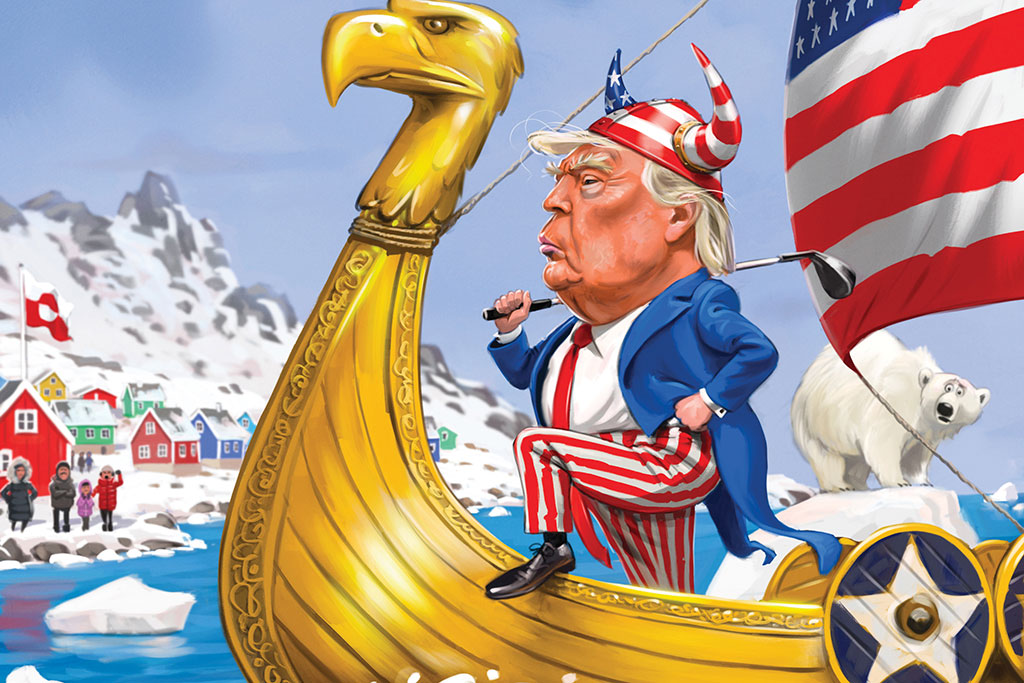Investors remain calm as the Middle East war unfolds
Conflict in the Middle East has failed to shake oil or stock markets. Can the peace hold?

Get the latest financial news, insights and expert analysis from our award-winning MoneyWeek team, to help you understand what really matters when it comes to your finances.
You are now subscribed
Your newsletter sign-up was successful
Want to add more newsletters?

Twice daily
MoneyWeek
Get the latest financial news, insights and expert analysis from our award-winning MoneyWeek team, to help you understand what really matters when it comes to your finances.

Four times a week
Look After My Bills
Sign up to our free money-saving newsletter, filled with the latest news and expert advice to help you find the best tips and deals for managing your bills. Start saving today!
Oil shock averted? World leaders and commodity traders have spent the past fortnight on edge as the long-running Iran-Israel conflict turned hot. Matters came to a head at the weekend when the US directly entered the war, bombing three Iranian nuclear facilities with fearsome bunker-buster bombs.
That dramatic escalation gave the lie to the popular notion that Donald Trump is a “chicken” (“Trump Always Chickens Out”, or TACO, as traders say), says Simon Nixon on Substack. In the grand scheme of things, few geopolitical events have a material impact on markets. But those that do – the 1970s oil crisis, or Russia’s 2022 invasion of Ukraine – have had devastating economic effects.
A “very weak” riposte
American B-2 Spirit bombers had breached Tehran’s reddest of red lines. The world waited with bated breath for its response. Iran’s parliament, which only has an advisory role, voted to close the Strait of Hormuz, the narrow passage responsible for shipping some 30% of the world’s seaborne oil. Analysts warned that such a scenario could send oil prices spiralling above $100 a barrel.
MoneyWeek
Subscribe to MoneyWeek today and get your first six magazine issues absolutely FREE

Sign up to Money Morning
Don't miss the latest investment and personal finances news, market analysis, plus money-saving tips with our free twice-daily newsletter
Don't miss the latest investment and personal finances news, market analysis, plus money-saving tips with our free twice-daily newsletter
In the event, Monday proved a turning point. Tehran didn’t close the strait. Instead, it fired missiles on a nearly empty American base in Qatar, telegraphed in advance – a face-saving de-escalation that Trump dubbed “very weak”. By Tuesday evening, a fragile ceasefire appeared to have taken hold.
Brent crude began to sell off “within seven minutes” of the first Iranian strikes in Qatar, say Malcolm Moore, George Steer and Jamie Smyth in the Financial Times. Within two hours, the price had dropped more than 7%. But for all the drama of flying missiles, traders had “correctly concluded that the attacks would reduce, rather than heighten, tensions”. Satellite images showed the US had removed aeroplanes from the air base days earlier. “It is all orchestrated, we know the base is empty,” said Jorge Montepeque of Onyx Capital.
Brent crude oil prices tumbled nearly 13% over Monday and Tuesday to trade below $68 a barrel as the Iran risk premium diminished. Global stock markets rallied, with America’s S&P 500 jumping to within 1% of the record high it reached in February.
The risk that Iran would actually go through with closing Hormuz may always have been overstated, according to Tom Holland and Tom Miller of Gavekal Research. America would not be the major victim of a closure of Hormuz. These days, most of the oil that flows through the strait heads east to Asia. China sources “around half of its oil imports from the region”. Closing Hormuz would harm Iran’s friends more than its opponents.
Oil glut incoming
Just a few years ago, an Israeli attack on Iran’s nuclear programme was regarded as the ultimate oil-market tail risk, says Javier Blas on Bloomberg. Analysts talked of oil topping its $147-a-barrel all-time high, or even going above $200 a barrel for the first time. Yet the rise of US shale has transformed energy markets. Indeed, for all the “hysteria” about Hormuz, the world now looks to be heading for an oil supply surge. Opec producers have raised production quotas, and the evidence suggests that Iran’s own production will hit “a fresh seven-year high” this month, an amazing achievement given the country has endured two weeks of bombing.
It’s worth remembering that oil kept flowing largely uninterrupted during the first and second Gulf Wars, and the end of both conflicts brought a fresh jump in supply. If history is any guide, oil prices could be poised to fall “quite a lot”.
The US shale revolution has transformed global power politics, agrees Ambrose Evans-Pritchard in The Telegraph. American frackers have been adding the equivalent of “a new North Sea every three years”. Today the country is “by far the largest combined producer of oil, petroleum products and natural gas” in the world.
Previous US administrations avoided striking Iran for fear of triggering an oil crisis. Thanks to shale, today the country’s leaders have the energy independence to push Iranian leader Ayatollah Ali Khamenei much harder than in the past. “It is undoubtedly a stunning political victory for Trump.”
A pause, not peace
Israel’s prime minister Benjamin Netanyahu has also won a “dazzling, daunting, dangerous victory”, says The Economist. An irate Trump very publicly forced him to halt strikes on Iran on Tuesday, but this nevertheless remains a “moment of triumph”. Israel, a nation of ten million people, has gained “air superiority over much of the Middle East” and subdued its most dangerous enemies in a multi-front war that began on 7 October 2023.
Investors have noticed the geopolitical shift, says David Wainer in The Wall Street Journal. The Israeli TA-125 share index has outperformed the global average, climbing 11.5% over the past month. It registered five straight daily gains last week even as ballistic missiles rained down on Tel Aviv and Haifa.
Why the euphoria? The bet appears to be that the “risk premium” attached to investing in Israel is falling as threats diminish from Hezbollah and Iran. That could encourage more inward investment from abroad. Yet risks remain, from an Iranian regime that might choose to accelerate its nuclear programme to “international opprobrium” over the unresolved Palestinian conflict.
Future developments remain unpredictable, says Marc Champion on Bloomberg. Will the humiliated Iranian regime survive? Will it accelerate its nuclear programme to deter future attacks? The current ceasefire should hold – Iran has few ways to strike back, and Israel has achieved its main military objectives. But “there will be no forever-peace between the Islamic Republic and Israel”.
This article was first published in MoneyWeek's magazine. Enjoy exclusive early access to news, opinion and analysis from our team of financial experts with a MoneyWeek subscription.
Get the latest financial news, insights and expert analysis from our award-winning MoneyWeek team, to help you understand what really matters when it comes to your finances.
Alex is an investment writer who has been contributing to MoneyWeek since 2015. He has been the magazine’s markets editor since 2019.
Alex has a passion for demystifying the often arcane world of finance for a general readership. While financial media tends to focus compulsively on the latest trend, the best opportunities can lie forgotten elsewhere.
He is especially interested in European equities – where his fluent French helps him to cover the continent’s largest bourse – and emerging markets, where his experience living in Beijing, and conversational Chinese, prove useful.
Hailing from Leeds, he studied Philosophy, Politics and Economics at the University of Oxford. He also holds a Master of Public Health from the University of Manchester.
-
 New PM Sanae Takaichi has a mandate and a plan to boost Japan's economy
New PM Sanae Takaichi has a mandate and a plan to boost Japan's economyOpinion Markets applauded new prime minister Sanae Takaichi’s victory – and Japan's economy and stockmarket have further to climb, says Merryn Somerset Webb
-
 Plan 2 student loans: a tax on aspiration?
Plan 2 student loans: a tax on aspiration?The Plan 2 student loan system is not only unfair, but introduces perverse incentives that act as a brake on growth and productivity. Change is overdue, says Simon Wilson
-
 New PM Sanae Takaichi has a mandate and a plan to boost Japan's economy
New PM Sanae Takaichi has a mandate and a plan to boost Japan's economyOpinion Markets applauded new prime minister Sanae Takaichi’s victory – and Japan's economy and stockmarket have further to climb, says Merryn Somerset Webb
-
 Profit from MSCI – the backbone of finance
Profit from MSCI – the backbone of financeAs an index provider, MSCI is a key part of the global financial system. Its shares look cheap
-
 'AI is the real deal – it will change our world in more ways than we can imagine'
'AI is the real deal – it will change our world in more ways than we can imagine'Interview Rob Arnott of Research Affiliates talks to Andrew Van Sickle about the AI bubble, the impact of tariffs on inflation and the outlook for gold and China
-
 How Canada's Mark Carney is taking on Donald Trump
How Canada's Mark Carney is taking on Donald TrumpCanada has been in Donald Trump’s crosshairs ever since he took power and, under PM Mark Carney, is seeking strategies to cope and thrive. How’s he doing?
-
 Three promising emerging-market stocks to diversify your portfolio
Three promising emerging-market stocks to diversify your portfolioOpinion Omar Negyal, portfolio manager, JPMorgan Global Emerging Markets Income Trust, highlights three emerging-market stocks where he’d put his money
-
 Exciting opportunities in biotech
Exciting opportunities in biotechBiotech firms should profit from the ‘patent cliff’, which will force big pharmaceutical companies to innovate or make acquisitions
-
 What turns a stock market crash into a financial crisis?
What turns a stock market crash into a financial crisis?Opinion Professor Linda Yueh's popular book on major stock market crashes misses key lessons, says Max King
-
 Why does Trump want Greenland?
Why does Trump want Greenland?The US wants to annex Greenland as it increasingly sees the world in terms of 19th-century Great Power politics and wants to secure crucial national interests